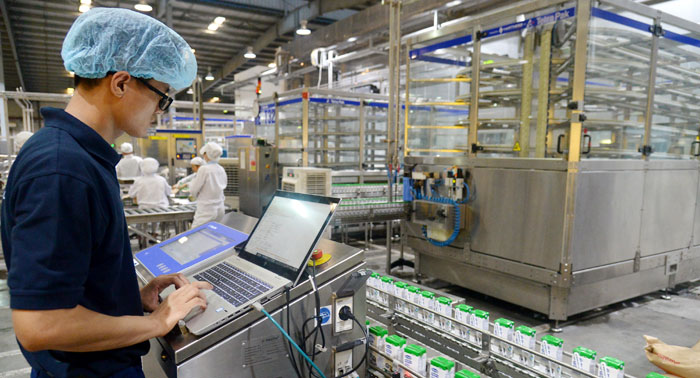Vietnam urged to deepen skills development for transition to Industry 4.0
While 68% of training institutions in Vietnam reported feeling well equipped for 4IR, this was lower than Cambodia (73%), the Philippines (81%) and Indonesia (95%).
Vietnam needs to develop dedicated technical and vocational education and training (TVET) programs to enable its transition to the fourth industrial revolution (4IR), increasing worker productivity and the country’s competitiveness, says a new study of the Asian Development Bank (ADB).
| Applying technologies in production at Vinamilk. Photo: Pham Hung. |
ADB’s study Reaping the Benefits of Industry 4.0 Through Skills Development in Vietnam examines the logistics and agro-processing industries in Viet Nam which are both important for growth, employment, international competitiveness, and 4IR. It finds that 4IR technologies will eliminate between a quarter and a third of jobs in these industries, but these would be more than offset by new labor demand, which could lead to positive job gains in both sectors.
ADB Country Director for Viet Nam Andrew Jeffries said while applications of 4IR technologies will help the country move up the value chain in products and services, Vietnam should consider new approaches to ensure inclusion and social protection for entry level workers, especially those at risk of job displacement, and those who need upskilling.
“Adequate and timely investments in skills development can help the country not only to harness the potential of 4IR to increase productivity but also ensure the 4IR will benefit workers at large,” Jeffries said.
Because of the impact of Covid-19 on supply- and value chains, Vietnam’s agro-processing industry will need to adjust to shifting consumer behavior. While logistics should see a post-pandemic upswing due to the growth of e-commerce and the changing nature of retail, both industries will have to embrace digital supply chains and launch digital initiatives – rendering the need to upskill and reskill even more urgent.
The study is part of a four-country study of ASEAN nations that also includes Cambodia, Indonesia, and the Philippines.
While 68% of training institutions in Vietnam reported feeling well equipped for 4IR, this was lower than Cambodia (73%), the Philippines (81%) and Indonesia (95%). There is also a mismatch in perceptions between training institutions and employers in the preparedness of graduates to work. Only 4% of training institutions reported using online training platforms while 18% reported using augmented reality and virtual reality tools for training.
“As 4IR technologies spread rapidly, extensive investments in digital skills will improve the chances of the young and old to access higher quality jobs and lower the risk of job losses,” said ADB Principal Education Specialist Shanti Jagannathan. “Now is the time to re-think delivery of skills using virtual platforms and mobile technologies, develop agile training institutions with courses and credentials that match labor market needs”.













